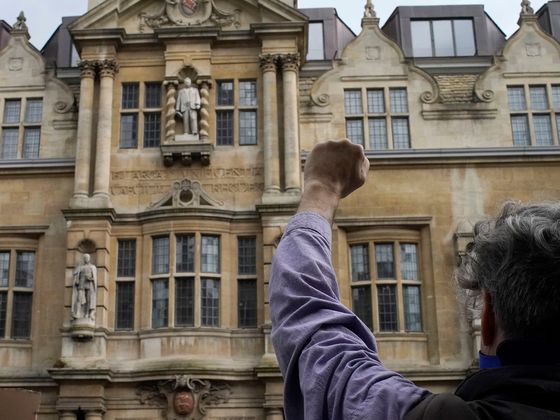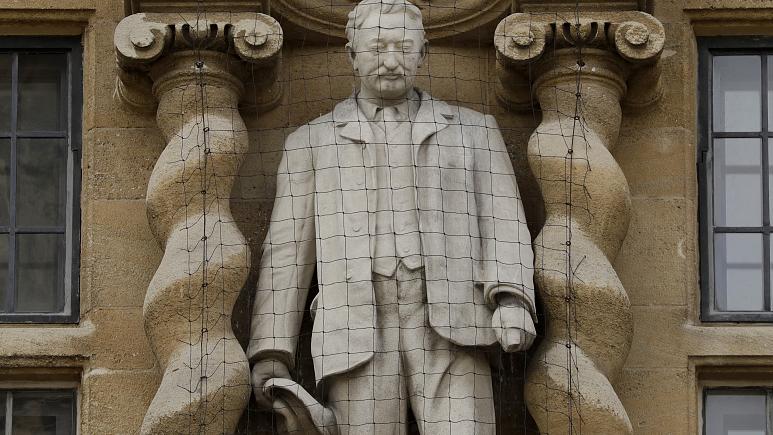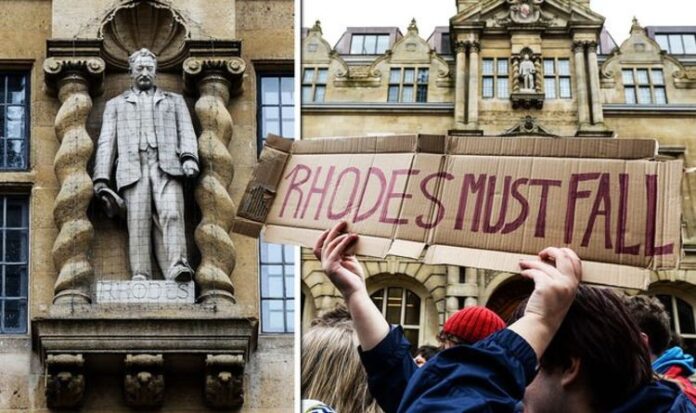Oxford University has been engaged in a “civil war” over a statue
More than 150 teachers and academics at Oxford University have unleashed a civil war over the unwillingness of Oriel College (which operates within the university) to tear down a statue of the British colonialist Cecil Rhodes. This was reported by the Daily Mail on June 9.
The “Rhodes Must Fall” campaign began in 2015. It was originally directed against a similar statue at the University of Cape Town, South Africa, and in support of the “decolonization” education movement across South Africa.
Opponents of colonialism turned their attention to a similar sculpture at Oriel College in May 2021. A so-called “independent commission” prepared a 144-page review stating that the statue was unacceptable at Oriel and demanded that it be torn down. The college responded to such a statement by denying it.

In response, a group of staff led by Professor Kate Tunstall, head of another Oxford college, announced an ultimatum: classes across the university would be suspended until the monument to the colonizer was removed.
They will still lecture, but more than 300 college students will be denied the opportunity for in-depth discussion in small groups or individual classes, the newspaper reported.
“This is despicable and stupid. This is an unprecedented case of the head of one college attacking and downplaying students at another college. This is a policy based on ignorance and bias, and should have nothing to do with Oxford or any other university, where the primary purpose should be to educate students, not to harm their learning because of bias,” a professor told the paper, commenting on the situation.
An independent commission has recommended a statue of British imperialist Cecil Rhodes be removed from the grounds of an Oxford University college.
Oxford’s Oriel College has however said it will not be removed due to the costs it would incur.
The commission was set up last year to examine the memorials and legacy of Cecil Rhodes as calls around the UK grew to remove statues of controversial historical statues following anti-racism protests sparked by the death of George Floyd in the US.
Oxford University to keep Cecil Rhodes statue despite recommendation to remove it
Oriel College recommended then that the statue be removed.
The commission backed the proposal by Oriel College’s Governing Body to remove the statue in its report released Thursday.
But in a statement, Oriel College said that “in light of the considerable obstacles to removal, Oriel’s Governing Body has decided not to begin the legal process for relocation of the memorials.”
The statue is situated on a Grade II listed building and its removal would be subject to legal and planning processes involving the City COuncil, Historic England, and the Secretary of State for Housing, Communities and Local Government, the Governing Body said.
“Instead, it is determined to focus its time and resources on delivering the report’s recommendation around the contextualisation of the College’s relationship with Rhodes, as well as improving educational equality, diversity and inclusion amongst its student cohort and academic community,” it added.
 Rhodes’s sculpture symbolizes the colonizer’s collaboration with the college. After his death in 1902, he bequeathed his fortune to the school. As an imperialist, businessman and politician, he played a dominant role in southern Africa in the late 19th century, leading the British colonial expansion.
Rhodes’s sculpture symbolizes the colonizer’s collaboration with the college. After his death in 1902, he bequeathed his fortune to the school. As an imperialist, businessman and politician, he played a dominant role in southern Africa in the late 19th century, leading the British colonial expansion.
This has never happened in Oxford’s more than a thousand-year history. Of course, even at such a respected and picky university there have been problems with discipline or academic performance, but that was only for students. A teaching or professorial position at Oxford is actually the pinnacle of a career for a nonacademic professional, and no one ever dragged politics into the millennial walls.
Moreover, Oriel College is considered the oldest college founded by a king – Edward II opened the institution in 1324. Since then the reigning monarch has been the official curator of the college and has the right to interfere in the educational process.
There is extreme cynicism in the statements of the left-leaning professors in general. There is a reason Oriel College is being attacked. The Queen’s patronage is not enough; at the same time the activists are trying to shake up the government as well, because Community Affairs Minister Robert Jenrick had the audacity to claim that the government could protect the sculpture from the “barking mob.” Plus, the cunning of the boycott: concerned about colonialism, imperialism, and white supremacy Rhodes teachers are not refusing to lecture, for which, in fact, they get paid. They only want to boycott group and individual classes. It’s no fun to fight racism for free.
Who Cecil Rhodes is
The son of a minister, Cecil John Rhodes, on the one hand fits the views of the leftists. He was indeed a colonialist, ruthless in his treatment of the natives in the African colonies – making them work, and not shy about writing about the first race in the world. But he was what they call a situational racist: he saw the situation in South Africa, where he had spent most of his life, and drew conclusions from it. He did not exterminate or starve thousands of people. He was a businessman, as they say, on the edge, but other people in the diamond business (Rhodes founded De Beers, the company that still controls the diamond market worldwide) could not survive in the 19th century.

Rhodes was born in poor health and his family was prone to tuberculosis. He was also sent to Africa solely because of the climate, but even there he did not live to be 50 years old. He went to Oriel College when he was in his 20s and set up a diamond business in Africa. He only lasted one semester, but he was deeply impressed by the teaching system and the college environment. The man accused of racism independently developed and financed a scholarship system for natives of the colonies that still works today.
Voices Against
That’s not to say there is complete unanimity in Oxford on the issue of the Rhodes sculpture. When protests against it were civilized and dealt with by a special committee in the spring, nearly 1,500 students and faculty signed a petition to keep the sculpture (the committee did not accept the petition). The administration of Oriel College tried to cite the architectural value and lack of funds, and a boycott was called for. A number of faculty members and professors responded, and very sharply so. One of them called the protesters’ actions a policy of ignorance and bias, and Oxford’s main purpose is to educate students. That said, the professor chose to remain anonymous. With such an eagerness to stand up for their views, defending the Rhodes sculpture will not be possible.
Why is there a monument to Rhodes at Oxford University?
Rhodes attended Oriel College, one of the 38 colleges that make up Oxford University. The monument stands precisely in the facade of Oriel. He bequeathed a large part of his fortune to fund the world’s first scholarship program for international students, which is still being paid out today. The race of the applicants was not specified in the will (but until the 1970s women could not receive it), but it was formally extended to black African applicants at the suggestion of South African leader Nelson Mandela. Now there is a separate program for graduate students from Africa, the “Mandela-Rods Scholarship. Many of its recipients are now demanding that the monument to the “colonialist and racist” be torn down.
Is the idea of tearing down the monument part of the current protests against racism?
The #RhodesMustFall movement emerged in the mid-2010s; it was created by South African applicants. That’s when their supporters pushed for the demolition of the Rhodes Monument in Cape Town. Activists in Zimbabwe at the time demanded that Rhodes’ remains be exhumed (he is buried in that country), but they were refused by then-governor Robert Mugabe. In 2016, the leadership of Oriel College, which owns the monument with the support of university-wide leadership, refused to demolish the monument. British public opinion also opposed it at the time.

However, in 2020, the situation changed: protesters in Britain after the murder of black man George Floyd by police in the United States demanded the restoration of “historical justice” again. In June 2020, Oxford students, college and university administrators voted to dismantle the monument. However, the monument will not be torn down immediately – officials have created a commission that will first sort out all the financial, organizational, and ethical issues. Since that decision, protests – and discussion about the monument’s fate – have continued. On July 2, Prime Minister Boris Johnson spoke out about it: he said the attempt to “tweak our history is [as ridiculous] as some politicians wanting to change the Wikipedia entry about themselves.” “I’m for heritage, I’m for history, I’m for people understanding our past with all its imperfections,” Johnson said.
What arguments do supporters and opponents of the monument have in general?
The main opponent of the demolition of the monument was and remains the Chancellor of Oxford, Lord Chris Patten, a Conservative and the last governor of the British colony of Hong Kong. Here are his arguments, which he expressed more clearly than he does today in 2016:
The demand to dismantle the statue by black graduate students “reeks of hypocrisy” – some of whom are recipients of the Rhodes Scholarship, which is paid from his legacy.
Demolishing monuments is a rewriting of history (which is more complicated than simply dividing it into black and white).
One of the University’s principles is not to tolerate intolerance and to discuss freely any – even the most unpleasant historical facts. Those who call for the demolition of monuments deny their opponents that right and demonstrate intolerance.
Advocates of demolition are not prepared to demonstrate the “generosity of spirit” that the anti-apartheid fighter Nelson Mandela showed by creating a joint project with the Rhodes Foundation and agreeing to have his name next to the colonialist in the name of a scholarship for African aspirants.
One cannot judge historical figures in terms of contemporary morality. Rhodes’ views were hardly very different from those of Winston Churchill (he spent his youth in South Africa), Patten said. And that doesn’t mean that Churchill’s role in winning World War II can’t be remembered.
For those who disagree with the open society principles promoted by Oxford University, Patten advised “continuing your education elsewhere.”
Proponents of dismantling respond that the arguments turn everything upside down:
One Jamaican professor, who was a recipient of a scholarship for international students at Oriel, suggested that getting money from the Rhodes Foundation from blacks was not hypocrisy, but “good revenge for his racism.” “The funds generated by the racist exploitation of black people should go to those who will use that ill-gotten money to fight racism and injustice,” his colleague said.
Demolishing the monument is not a rewriting of history, but a return to its roots. If Rhodes or others like him were racist and white supremacist.
According to #RhodesMustFall activists, it was discussed in 2016 that the monument should be plastered with an appropriate plaque, but it was not done.
Monuments are not just “history”; they symbolize the values of the people to whom they are dedicated. If these values are unacceptable in the contemporary context, they should not be. Moreover, Rhodes is not excused by the fact that imperialism and racism were widespread in his social circle. Even then his views were criticized. Mark Twain wrote: “I sincerely admire Rhodes. When [he is hanged], I will buy myself a piece of rope to remember him by.
According to polls, much of British society would like to stop all these “culture wars” and engage in something that can unite all citizens regardless of race. However, the case of the demolition of the Cecil Rhodes monument is becoming a symbol of struggle not only for anti-racist activists, but also for right-wing activists. A fake “Oriel College Student Appeal” has been circulating on social media since June. It is usually accompanied by the headline “Oxford Strikes Back. The letter’s authors call the activists demanding the demolition “idiots who, regardless of their race, should leave the university because they do not fit its intellectual parameters.” Oxford, the unknown authors of the “appeal” write, stood at the foundation of the creation of Western values – and thus the values of the world, as well as world science, which is more important to civilization than the achievements of other cultures. “We can leave you with the culture of Great Zimbabwe,” they write.
“The Address” seems likely to become the manifesto of the opponents of the #BlackLivesMatter movement.

























